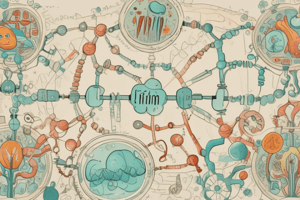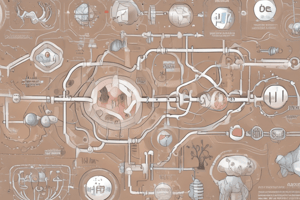Podcast
Questions and Answers
Which amino acid metabolic pathway is primarily responsible for the removal of the amino group to generate ammonia?
Which amino acid metabolic pathway is primarily responsible for the removal of the amino group to generate ammonia?
- Amino acid degradation (correct)
- Transamination
- Urea cycle
- Amino acid biosynthesis
What illness is commonly associated with genetic defects in amino acid metabolism?
What illness is commonly associated with genetic defects in amino acid metabolism?
- Alzheimer's disease
- Phenylketonuria (PKU) (correct)
- Diabetes
- Cystic fibrosis
Which of the following metabolites is generated from methionine breakdown and is a risk factor for heart disease?
Which of the following metabolites is generated from methionine breakdown and is a risk factor for heart disease?
- Homocysteine (correct)
- Oxaloacetate
- Urea
- Acetoacetate
Which of the following amino acid catabolism products is used in the TCA cycle?
Which of the following amino acid catabolism products is used in the TCA cycle?
Why is it essential to have sufficient amino acids in our diet?
Why is it essential to have sufficient amino acids in our diet?
What is the effect of arginase deficiency in arginemia?
What is the effect of arginase deficiency in arginemia?
Which amino acids can be synthesized in the body as non-essential?
Which amino acids can be synthesized in the body as non-essential?
Which disorder is caused by a defect in carbamoyl phosphate synthase I?
Which disorder is caused by a defect in carbamoyl phosphate synthase I?
Under which condition is arginine considered an essential amino acid?
Under which condition is arginine considered an essential amino acid?
What happens to the amino group nitrogen in amino acids?
What happens to the amino group nitrogen in amino acids?
What is a potential consequence of a high-protein diet for someone with a urea cycle defect?
What is a potential consequence of a high-protein diet for someone with a urea cycle defect?
Which of the following amino acids cannot be synthesized by the human body?
Which of the following amino acids cannot be synthesized by the human body?
How are amino acids classified?
How are amino acids classified?
What is the primary purpose of transamination in amino acid metabolism?
What is the primary purpose of transamination in amino acid metabolism?
Which two sources contribute nitrogen to urea during the urea cycle?
Which two sources contribute nitrogen to urea during the urea cycle?
Why does the urea cycle only occur in the liver?
Why does the urea cycle only occur in the liver?
What condition results from a deficiency in urea cycle enzymes?
What condition results from a deficiency in urea cycle enzymes?
What is one of the first symptoms of urea cycle defects in neonates?
What is one of the first symptoms of urea cycle defects in neonates?
What role does glutamate dehydrogenase play in amino acid metabolism?
What role does glutamate dehydrogenase play in amino acid metabolism?
Which treatment is recommended for managing hyperammonemia in patients with urea cycle disorders?
Which treatment is recommended for managing hyperammonemia in patients with urea cycle disorders?
What is the final product of the urea cycle after arginine is hydrolyzed?
What is the final product of the urea cycle after arginine is hydrolyzed?
Which amino acid is essential for the synthesis of serotonin?
Which amino acid is essential for the synthesis of serotonin?
In PKU patients, which amino acid becomes essential due to the inability to metabolize phenylalanine?
In PKU patients, which amino acid becomes essential due to the inability to metabolize phenylalanine?
Which compound is formed from the amino acid arginine in the body?
Which compound is formed from the amino acid arginine in the body?
Which amino acids are required to synthesize glutathione, an important antioxidant?
Which amino acids are required to synthesize glutathione, an important antioxidant?
What is the primary role of tyrosine in the synthesis of catecholamines?
What is the primary role of tyrosine in the synthesis of catecholamines?
Which of the following is a precursor for the synthesis of thyroid hormone thyroxine?
Which of the following is a precursor for the synthesis of thyroid hormone thyroxine?
Which amino acid is essential for synthesizing heme, a crucial component of hemoglobin?
Which amino acid is essential for synthesizing heme, a crucial component of hemoglobin?
What is the function of nitric oxide synthesized from arginine at low concentrations?
What is the function of nitric oxide synthesized from arginine at low concentrations?
Flashcards
Amino Acid Catabolism
Amino Acid Catabolism
The breakdown of amino acids, releasing energy and generating metabolic intermediates.
Transamination
Transamination
The transfer of an amino group from an amino acid to an alpha-keto acid, generating a new amino acid and an alpha-keto acid.
Metabolic Intermediates from Amino Acid Catabolism
Metabolic Intermediates from Amino Acid Catabolism
Products of amino acid breakdown that can enter the citric acid cycle (TCA cycle), generating energy or being used for other metabolic processes.
Phenylketonuria (PKU)
Phenylketonuria (PKU)
Signup and view all the flashcards
Homocysteine
Homocysteine
Signup and view all the flashcards
Urea Cycle Disorders
Urea Cycle Disorders
Signup and view all the flashcards
Arginemia
Arginemia
Signup and view all the flashcards
Argininosuccinate Acidemia
Argininosuccinate Acidemia
Signup and view all the flashcards
Carbamoyl Phosphate Synthase I Deficiency
Carbamoyl Phosphate Synthase I Deficiency
Signup and view all the flashcards
Essential Amino Acids
Essential Amino Acids
Signup and view all the flashcards
Non-essential Amino Acids
Non-essential Amino Acids
Signup and view all the flashcards
Arginine Synthesis
Arginine Synthesis
Signup and view all the flashcards
What happens to tyrosine in PKU?
What happens to tyrosine in PKU?
Signup and view all the flashcards
Amino Acid Uses
Amino Acid Uses
Signup and view all the flashcards
Heme Synthesis
Heme Synthesis
Signup and view all the flashcards
Dopamine Precursor
Dopamine Precursor
Signup and view all the flashcards
Serotonin Production
Serotonin Production
Signup and view all the flashcards
Nitric Oxide Role
Nitric Oxide Role
Signup and view all the flashcards
Nitroglycerin Action
Nitroglycerin Action
Signup and view all the flashcards
What is transamination?
What is transamination?
Signup and view all the flashcards
What is the role of glutamate in amino acid degradation?
What is the role of glutamate in amino acid degradation?
Signup and view all the flashcards
What is oxidative deamination?
What is oxidative deamination?
Signup and view all the flashcards
Where does the urea cycle occur?
Where does the urea cycle occur?
Signup and view all the flashcards
What is the purpose of the urea cycle?
What is the purpose of the urea cycle?
Signup and view all the flashcards
What is the source of nitrogen in urea?
What is the source of nitrogen in urea?
Signup and view all the flashcards
What are urea cycle disorders?
What are urea cycle disorders?
Signup and view all the flashcards
What are the common symptoms of urea cycle disorders?
What are the common symptoms of urea cycle disorders?
Signup and view all the flashcards
Study Notes
Amino Acid Metabolism Overview
- Amino acid metabolism encompasses degradation (catabolism), biosynthesis (anabolism), and the role of amino acids as precursors for nitrogen-containing compounds.
- The urea cycle is crucial for the disposal of amino group nitrogen.
- Genetic defects in amino acid metabolism lead to serious diseases like phenylketonuria (PKU), which is notably common in Ireland.
- Methionine breakdown generates homocysteine, a risk factor for heart disease.
- Amino acid breakdown produces ammonia and urea; toxicity is a concern
- Dietary needs for amino acids are crucial in health and disease.
Amino Acid Degradation (Catabolism)
- Amino acid degradation involves the disposal of amino group nitrogen.
- Transamination converts amino acids into α-keto acids, generating glutamate, pyruvate, and oxaloacetate.
- Oxidative deamination removes the amino group from glutamate, releasing ammonia.
- The ammonia is further processed through the urea cycle for excretion.
Urea Cycle
- The urea cycle in liver cells converts ammonia to urea, a less toxic compound.
- Specific enzymes drive the urea cycle, with one nitrogen from ammonia and another from aspartate being incorporated into urea.
- Urea is excreted by the kidneys. This process is vital to maintain proper nitrogen balance.
- Defects in urea cycle enzymes lead to urea cycle disorders.
- These disorders result in hyperammonemia (high blood ammonia).
- Symptoms in neonates often present between 24 and 72 hours following birth and include lethargy, nausea, convulsions, and coma.
- Reduced protein intake and specific medications (e.g., phenylbutyrate) can help manage hyperammonemia.
Amino Acid Biosynthesis (Anabolism)
- The synthesis of non-essential amino acids occurs via transamination reactions.
- α-Keto acids serve as precursors in transamination reactions to create alanine, aspartate, and glutamate.
- Some amino acids may be considered essential, meaning they must be supplied through diet.
- Arginine is an example of an amino acid that, though synthesizable, may need to be acquired through diet in some circumstances, such as in growing children.
- Tyrosine is considered essential in the presence of PKU.
Amino Acids as Precursors
- Amino acids serve as precursors for numerous nitrogen-containing compounds, including heme, neurotransmitters (e.g., dopamine, norepinephrine, epinephrine, serotonin), nitric oxide, and important molecules like creatine and glutathione.
- Specific amino acids are the starting blocks for these molecules.
Summary (Clinical Relevance)
- Metabolic defects in these processes can cause serious diseases.
- Clinical implications include dietary restrictions, potential toxicity from ammonia, and the need for specific treatments and monitoring in cases of related disorders.
Studying That Suits You
Use AI to generate personalized quizzes and flashcards to suit your learning preferences.




